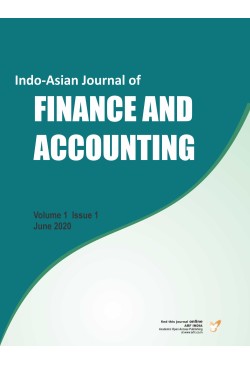
Indo-Asian Journal of Finance and Accounting
Frequency :Bi-Annual
ISSN :2582-6395
Peer Reviewed Journal
An Empirical Study of Agricultural Financing and Its Implication on Rural Poverty Alleviation in Nigeria
Zwingina Christy Twaliwi (2023). An Empirical Study of Agricultural Financing and Its Implication on Rural Poverty Alleviation in Nigeria. Indo-Asian Journal of Finance and Accountings. 4(1), 1-22. https://DOI:10.47509/IAJFA.2023.v04i01.01
FinTech and Digital Finance: Foes or Friends after COVID-19 Pandemic?
Parul Mittal & Sonal Gupta (2023). FinTech and Digital Finance: Foes or Friends after COVID-19 Pandemic?. Indo-Asian Journal of Finance and Accountings. 4(1), 23-40. https://DOI:10.47509/IAJFA.2023.v04i01.02
Empirical Analysis of the Effects of Sustainability Reporting on Financial Performance of Quoted Healthcare Firms in Nigeria
The main objective of this study is to examine the effect of sustainability reporting on financial performance of healthcare companies in Nigeria. The impacts of the activities of healthcare companies of often result in social and ecological problems. It is expected of companies to take care of these problems as well as contribute reasonably to improving the environment. Ex-post facto research design and content analysis were adopted. The population of the study was listed healthcare companies in Nigeria. A sample of 8 healthcare firms was purposively selected for a period of 7 years, resulting in 56 observations. The data were analyzed using descriptive statistics and regression analysis. The result of the analysis showed a beta coefficient of -0.047 for environmental reporting, which means that -4.7% of the variation in financial performance in the healthcare companies in influenced by environmental reporting. A beta coefficient of 0.279 was reported for economic reporting. This implies that 27.9% of the variation in financial performance in the healthcare companies is accounted for by economic reporting. Findings also showed a beta coefficient of -0.337 for social reporting, implying that -33.7% of the variation in financial performance in the healthcare companies is caused by social reporting. The result means that more social reporting will decrease the financial performance of the selected companies. In addition, the result showed an adjusted R-square of 0.424 for sustainability reporting in the annual reports by healthcare companies in Nigeria. It was recommended that the policy makers in government should enforce the inclusion of sustainability reports in the annual reports by healthcare companies.
Keywords: Sustainability Reporting, financial performance, Healthcare, Environmental Reporting
Etim Osim Etim, Nsima Johnson Umoffong, Dorathy Christopher Akpan & Augustine Brendan Inyang (2023). Empirical Analysis of the Effects of Sustainability Reporting on Financial Performance of Quoted Healthcare Firms in Nigeria. Indo-Asian Journal of Finance and Accountings. 4(1), 41-79. https://DOI:10.47509/IAJFA.2023.v04i01.03
Relationship between Economic Growth and Expenditure on Social Sector in India: An Econometric Investigation
Jitendra Kumar Sinha (2023). Relationship between Economic Growth and Expenditure on Social Sector in India: An Econometric Investigation. Indo-Asian Journal of Finance and Accountings. 4(1), 81-101. https://DOI:10.47509/IAJFA.2023.v04i01.04
Carbon Accounting Help Mitigation of Climate Change and Make A Greener World? An Empirical Analysis
One of the most serious environmental issues facing the world today is climate change, which has been brought about by humanity in response to issues like food and freshwater scarcity, hazards to natural ecosystems, health, etc. The earth’s climate system has undergone a significant global and local change from the preindustrial period. This gigantic concern of the globe is climate change affects the flora and fauna as well as man. So, every nation should scuffle to control the emission of gases which affects nature. The use of fossil fuels and the hazards caused by it should be considered by the authorities, corporate people as well as the common man. The United Nations Framework Convention on Climate Change elucidates that those human activities, whether direct or indirect which cause climate change should be controlled, particularly greenhouse gases. Carbon accounting is an incipient field of business economics that includes a wide range of activities, including the calculation, measurement, monitoring, reporting and auditing of greenhouse gas emissions at various levels like administrative, production process and supply chain levels. The Greenhouse Gas Protocol has various initiatives to support and motivate the industries in carbon accounting and reporting about their accomplishments in this field. There are various procedures for carbon accounting thatfacilitate industries to quantify their emissions. For the sake of achievement of climate policy and corporate goals, carbon accounting issues should be incorporated into various functional fields. In this study, the effects of greenhouse gases, carbon accounting and related matters are looked into for evaluation.
Keywords: climate change, emissions, greenhouse gases, carbon accounting
Ajith Kumar, Anil Kumar M. & Suraj E.S. (2023). Carbon Accounting Help Mitigation of Climate Change and Make a Greener World? An Empirical Analysis. Indo-Asian Journal of Finance and Accountings. 4(1), 103-113. https://DOI:10.47509/IAJFA.2023.v04i01.05
Financial Performance Analysis of the Steel Industry in India
Gautam Das (2023). Financial Performance Analysis of the Steel Industry in India. Indo-Asian Journal of Finance and Accountings. 4(1), 115-127. https://DOI:10.47509/IAJFA.2023.v04i01.06
Application of Panel Data Regression Model on the Capital Structure of Indian FMCG Sector for Determining its Possible Factors
Rajbinder Kaur, Shruti Gupta, Sekh Sabanaj & Pallavi Gupta (2023). Application of Panel Data Regression Model on the Capital Structure of Indian FMCG Sector for Determining its Possible Factors. Indo-Asian Journal of Finance and Accountings. 4(1), 129-143. https://DOI:10.47509/IAJFA.2023.v04i01.07
Innovation Types and Firm Performance in Nigeria
Olusola Joseph Dahunsi (2023). Innovation Types and Firm Performance in Nigeria. Indo-Asian Journal of Finance and Accountings. 4(1), 145-159. https://DOI:10.47509/IAJFA.2023.v04i01.08
Accountability in Financial Management of Head Teachers, Teachers and School Management Committee Chair Persons in Elementary Schools at Nilgiri, Balasore, Odisha, India